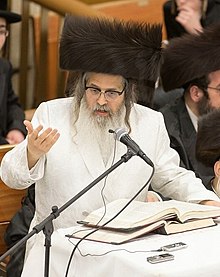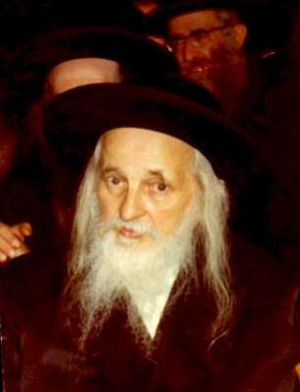
Joel Teitelbaum was the founder and first Grand Rebbe of the Satmar dynasty.

Satmar is a group in Hasidic Judaism founded in 1905 by Grand Rebbe Joel Teitelbaum (1887–1979), in the city of Szatmárnémeti, Hungary. The group is a branch of the Sighet Hasidic dynasty. Following World War II, it was re-established in New York and has since grown to become one of the largest Hasidic dynasties in the world, comprising around 26,000 households.

Vizhnitz is the name of a Hasidic dynasty founded by Rabbi Menachem Mendel Hager. Vizhnitz is the Yiddish name of Vyzhnytsia, a town in present-day Ukraine.

Bobov is a Hasidic community within Haredi Judaism, originating in Bobowa, Galicia, in southern Poland, and now headquartered in the neighborhood of Borough Park, in Brooklyn, New York.

Nadvorna is a Hasidic rabbinical dynasty deriving its name from the town of Nadvorna, (Nadvirna), today in Ukraine.

Munkatch Hasidism is a Hasidic sect within Haredi Judaism of mostly Hungarian Hasidic Jews. It was founded and led by Polish-born Grand Rebbe Shlomo Spira, who was the rabbi of the town of Strzyżów (1858–1882) and Munkacs (1882–1893). Members of the congregation are mainly referred to as Munkacs Hasidim, or Munkatcher Hasidim. It is named after the Hungarian town in which it was established, Munkatsh.

Shomer Emunim is a devout, insular Hasidic group based in Jerusalem. It was founded in the 20th century by Rabbi Arele (Aharon) Roth.

Moshe (Moses) Teitelbaum was a Hasidic rebbe and the world leader of the Satmar Hasidim.
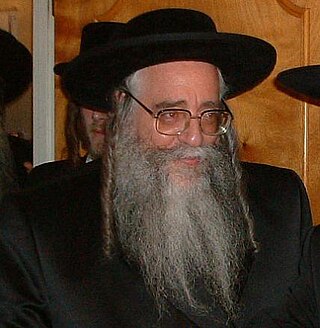
Zvi Elimelech Halberstam is the present Sanz Rebbe of Netanya, Israel. He is also known as the Sanzer Rebbe. He is the eldest son of Rabbi Yekusiel Yehudah Halberstam, the first Sanz-Klausenberger Rebbe, who in his will divided the leadership of the Klausenburger Hasidim between his two sons, Rabbi Zvi Elimelech and Rabbi Shmuel Dovid. He holds his court in the Kiryat Sanz, Netanya neighborhood founded by his father.

Yekusiel Yehudah Halberstam was a rebbe of the Hasidic dynasty of Sanz-Klausenburg.
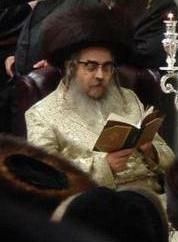
Aaron Teitelbaum is one of the two Grand Rebbes of Satmar, and the chief rabbi of the Satmar community in Kiryas Joel, New York.
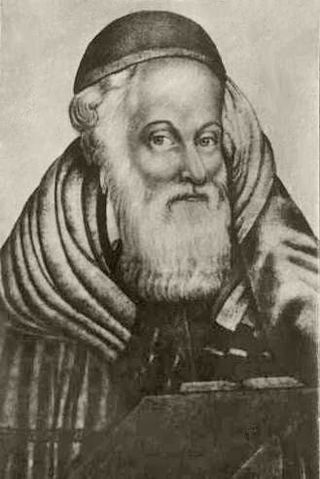
Moshe Teitelbaum, also known as the Yismach Moshe, was the Rebbe of Ujhely (Sátoraljaújhely) in Hungary. According to Leopold Löw, he signed his name "Tamar", this being the Hebrew equivalent of Teitelbaum, which is the Yiddish for "date palm". An adherent of the Polish Hasidic rebbe Yaakov Yitzchak of Lublin. Teitelbaum was instrumental in bringing Hasidic Judaism to Hungary. Though initially opposed to Hassidism, after his son-in-law introduced him to Jacob Isaac Horowitz, he soon became an adherent.

Yissachar Dov Rokeach is the fifth, and present, Rebbe of the Hasidic dynasty of Belz. He is the son of Rabbi Mordechai of Bilgoray, the grandson of the third Belzer Rebbe, Rabbi Yissachar Dov Rokeach, and the nephew of the fourth Belzer Rebbe, Rabbi Aharon Rokeach, who raised him. He has led Belz since 1966.

Dushinsky is one of the few Hasidic dynasties not named after the place where it originated; instead, it is named after the rebbe's surname. It is relatively new, and became a dynasty in Jerusalem, where it is centered today. Unlike other Hasidic groups, it does not originate from a Hasidic background, but from the talmidim (students) of Moses Sofer.

Congregation Yetev Lev D'Satmar is a large Satmar Hasidic synagogue located at Kent Avenue and Hooper Street in Williamsburg, Brooklyn, New York City, New York, United States.

Moshe Leib Rabinovich is the current rebbe of Munkacs.
Siget or Ujhel-Siget or Sighet Hasidism, or Sigter Hasidim, is a movement of Hungarian Haredi Jews who adhere to Hasidism, and who are referred to as Sigeter Hasidim.

Congregation Yetev Lev D'Satmar is a large Satmar Hasidic synagogue located at 152 Rodney Street in Williamsburg, Brooklyn, in New York City, New York, United States.
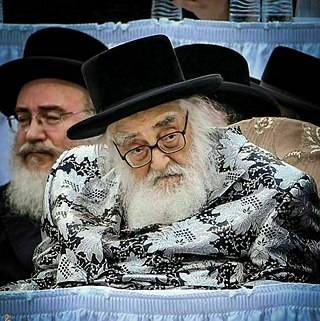
Mordechai Hager was the rebbe of the Hasidic sect of Vizhnitz for 46 years.

Alta Faige Teitelbaum, known as the Satmar Rebbetzin, was a Polish-born American Hasidic community leader. Teitelbaum's status as Rebbetzin was gained through her marriage to the first Rebbe (leader) of the Satmar Hasidic community, Rabbi Joel Teitelbaum (1887–1979). After her husband's death, the Satmar Rebbetzin gained a following of supporters who stood in opposition to her husband's successor, the second Rebbe of Satmar, Rabbi Moshe Teitelbaum (1914–2006).
